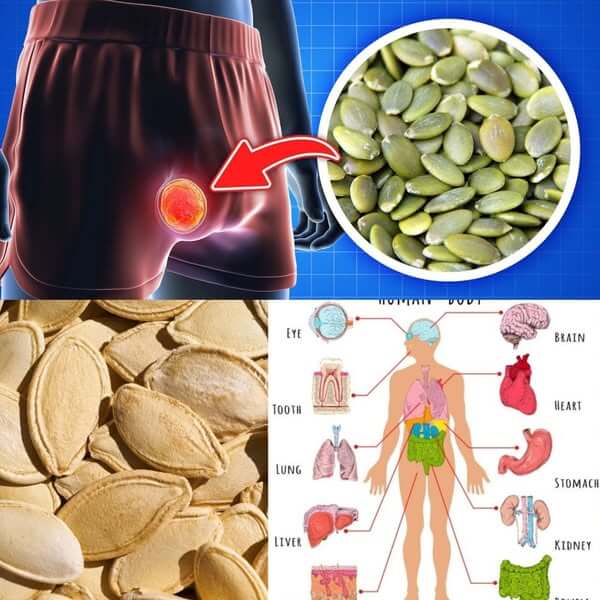Pumpkin Seed Consumption and Benefits to Your Health
Pepitas, another name for pumpkin seeds, are a great addition to your daily diet because they are not only tasty but also nutrient-dense. Here’s a thorough examination of what happens to your body when you incorporate pumpkin seeds into your daily diet.
Pumpkin seeds are rich in magnesium, manganese, copper, protein, zinc, and iron, according to their nutritional profile. They are also a wonderful source of phosphate, vitamin K, and beneficial fats. They also include antioxidants like vitamin E and carotenoids.
Benefits of Eating Pumpkin Seeds Every Day:
Better Heart Health;
Rich in fiber, antioxidants, and omega-3 and omega-6 fatty acids, pumpkin seeds may help maintain heart health by reducing blood pressure and raising good cholesterol.
Improved Prostate and Bladder Health: According to research, pumpkin seeds may be able to lessen the symptoms of benign prostatic hyperplasia (BPH), a disorder in which the prostate gland enlarges and causes urinary issues. They could also aid in enhancing bladder function.
Improved Sleep: Tryptophan, an amino acid that can aid in promoting sleep, is found naturally in pumpkin seeds. Because of their magnesium content, which is also known to support better sleep, eating them a few hours before bed may help enhance the quality of your sleep.
Better Blood Sugar Levels: Research indicates that some elements included in pumpkin seeds, such magnesium, may help reduce blood sugar levels, which is especially advantageous for diabetics.
Weight management: Pumpkin seeds, which are high in fiber and protein, can help you feel full and cut back on calories, both of which are beneficial for managing weight.
Benefits against Inflammation: Pumpkin seeds’ strong antioxidant content helps shield your cells from damaging free radicals and lessen inflammation. This is essential for lowering the chance of developing chronic illnesses.
Bone Health: One of the greatest natural sources of magnesium is pumpkin seeds, which are essential for the development of bones. Frequent ingestion can reduce the incidence of osteoporosis and preserve bone density.
The Best Way to Include Pumpkin Seeds in Your Diet:
Raw: Eat them as a snack or sprinkle over salads, yogurt, or smoothie bowls.
Roasted: Lightly roast with olive oil and spices for a crunchy, flavorful snack.
Blended: Add to smoothies or grind into a fine powder for baking and cooking.
Toppings: Use as a topping for soups, oatmeal, or stir-fries.
Pumpkin Seed Butter: Blend into a creamy spread as a nut-free alternative.
Considerations:
Although pumpkin seeds are typically healthy to eat, it’s important to consume them sparingly because they contain a lot of fat and calories. Pumpkin seeds should also be avoided by people who are allergic to seeds.
Including pumpkin seeds in your diet on a regular basis can improve your general health and well-being by offering a quick and easy natural option to increase your vitamin intake.
Recommended Daily Intake
1–2 tablespoons (about 15-30g) daily is a good amount to enjoy their benefits without excessive calorie intake.
A nutrient-dense superfood, pumpkin seeds are simple to include in your diet for improved digestion, immunity, heart health, and general well-being!

